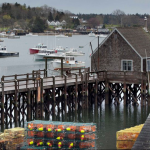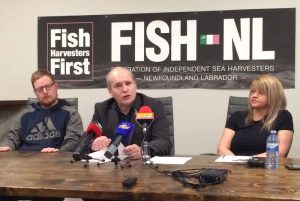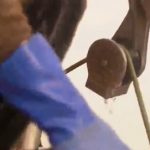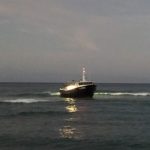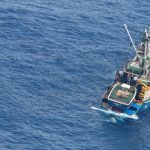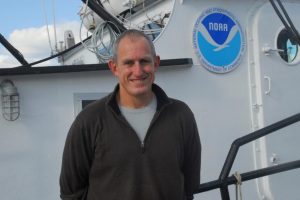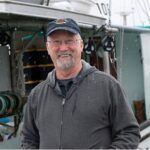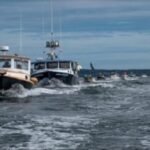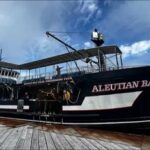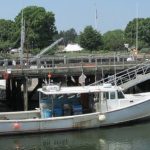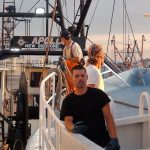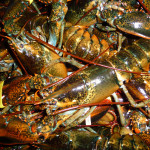Daily Archives: May 24, 2016
Bay of Fundy Fishermen raise cash for tidal power injunction
 Fishermen are building a legal war chest to launch a court fight against tidal power projects being tested this year in the Bay of Fundy. Chris Hudson, president of the Bay of Fundy Inshore Fisherman’s Association, says the rapid deployment of the test turbines is forcing the fishermen’s hands. At least two turbines are expected to be deployed in June. Hudson and a number of other sources confirmed the association is talking to legal counsel about an injunction to temporarily block the turbines from being deployed. “It’s not that we’re against it, but they shouldn’t be allowed to just jump over everybody,” Hudson said in an interview with the Chronicle Herald Tuesday. “They haven’t consulted with us and don’t have the proper studies in place,” he said. Hudson, who also started a petition last week, brought more than 60 of the highest-earning Bay of Fundy fishermen to the Digby fire hall Sunday night to discuss what to do. Multiple sources said members of the FORCE tidal power group also attended the meeting, but Hudson said the meeting was was to consult with fishermen. Read the rest here 20:44
Fishermen are building a legal war chest to launch a court fight against tidal power projects being tested this year in the Bay of Fundy. Chris Hudson, president of the Bay of Fundy Inshore Fisherman’s Association, says the rapid deployment of the test turbines is forcing the fishermen’s hands. At least two turbines are expected to be deployed in June. Hudson and a number of other sources confirmed the association is talking to legal counsel about an injunction to temporarily block the turbines from being deployed. “It’s not that we’re against it, but they shouldn’t be allowed to just jump over everybody,” Hudson said in an interview with the Chronicle Herald Tuesday. “They haven’t consulted with us and don’t have the proper studies in place,” he said. Hudson, who also started a petition last week, brought more than 60 of the highest-earning Bay of Fundy fishermen to the Digby fire hall Sunday night to discuss what to do. Multiple sources said members of the FORCE tidal power group also attended the meeting, but Hudson said the meeting was was to consult with fishermen. Read the rest here 20:44
‘Fraught With Defects’, Connecticut Lawmakers Urge Reforms To Fishing Regulations
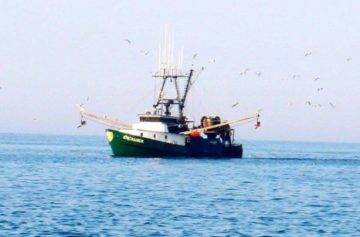 Connecticut’s congressional delegation is leading a renewed push for reform of federal commercial fishing quotas critics say are out of date, wasteful, fail to respond to climate change and unfair to New England fishermen. Warming ocean temperatures are pushing vast numbers of fish like black bass, summer flounder and scup farther north into New England waters, according to the delegation’s letter to federal officials, but old fishing quotas severely restrict how many of those fish commercial boats from this region are allowed to keep. The out-of-date quota system means that fishermen from North Carolina, Virginia and Maryland are allowed to take much larger numbers of those types of fish, even when they come to New England’s offshore waters to net them, according to a joint letter by Connecticut and Massachusetts members of Congress. Read the rest here 20:15
Connecticut’s congressional delegation is leading a renewed push for reform of federal commercial fishing quotas critics say are out of date, wasteful, fail to respond to climate change and unfair to New England fishermen. Warming ocean temperatures are pushing vast numbers of fish like black bass, summer flounder and scup farther north into New England waters, according to the delegation’s letter to federal officials, but old fishing quotas severely restrict how many of those fish commercial boats from this region are allowed to keep. The out-of-date quota system means that fishermen from North Carolina, Virginia and Maryland are allowed to take much larger numbers of those types of fish, even when they come to New England’s offshore waters to net them, according to a joint letter by Connecticut and Massachusetts members of Congress. Read the rest here 20:15
Louisiana: Shrimp season’s start isn’t a happy one – Low prices and fewer shrimp
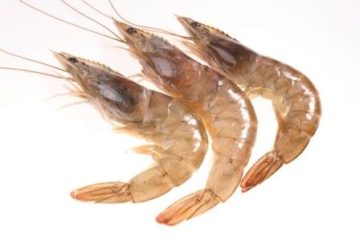 Shrimp season opened Monday. Observers say fishermen are caught between small catches and low prices. There are two shrimping seasons, spring and fall. Spring is considered the brown shrimp season, which opened Monday. “The season opened today, and the catch is way off from what it usually is,” commercial fisherman Rodney Olander said. “The grade is way smaller than what we usually open with and, as usual, the price is down on us.” Olander has worked as a commercial fisherman for 37 years. He docks his boat at Cypremort Point State Park and shrimps in Vermillion and Cote Blanche bays. That area usually produces more white shrimp than brown. “We’ve been sitting idle for the last six months, waiting for the season to open,” Olander said. “The season opens — there is not a lot of shrimp. The shrimp are small. And they plan on cutting the prices on us.” Read the story here 18:32
Shrimp season opened Monday. Observers say fishermen are caught between small catches and low prices. There are two shrimping seasons, spring and fall. Spring is considered the brown shrimp season, which opened Monday. “The season opened today, and the catch is way off from what it usually is,” commercial fisherman Rodney Olander said. “The grade is way smaller than what we usually open with and, as usual, the price is down on us.” Olander has worked as a commercial fisherman for 37 years. He docks his boat at Cypremort Point State Park and shrimps in Vermillion and Cote Blanche bays. That area usually produces more white shrimp than brown. “We’ve been sitting idle for the last six months, waiting for the season to open,” Olander said. “The season opens — there is not a lot of shrimp. The shrimp are small. And they plan on cutting the prices on us.” Read the story here 18:32
NEFSC, R/V Hugh R. Sharp Lose HabCam during Scallop survey, Fisheries Survival Fund takes them to task!
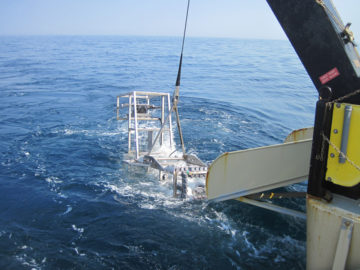 Last Thursday, May 19, 2016, while on the current scallop survey, the NEFSC crew lost the HabCam when it separated from the vessel. According to initial reports, it was inadvertently driven into the side of a known and charted shipwreck while being operated by a volunteer, losing at least a week of valuable sea time. Several knowledgeable sources have suggested that there could be as much as $100,000 in damage. Accordingly, the researchers must return to port to acquire a remote operated vehicle, which they will use to attempt to find the lost HabCam. The loss of a key piece of scallop survey equipment demonstrates the need for an overhaul of how the federal government assesses the species. The Fisheries Survival Fund (FSF), which represents the majority of the limited access scallop fleet, calls for reforms to how scallop surveys are conducted to prevent such an incident from derailing surveys in the future. Read the rest here 17:25
Last Thursday, May 19, 2016, while on the current scallop survey, the NEFSC crew lost the HabCam when it separated from the vessel. According to initial reports, it was inadvertently driven into the side of a known and charted shipwreck while being operated by a volunteer, losing at least a week of valuable sea time. Several knowledgeable sources have suggested that there could be as much as $100,000 in damage. Accordingly, the researchers must return to port to acquire a remote operated vehicle, which they will use to attempt to find the lost HabCam. The loss of a key piece of scallop survey equipment demonstrates the need for an overhaul of how the federal government assesses the species. The Fisheries Survival Fund (FSF), which represents the majority of the limited access scallop fleet, calls for reforms to how scallop surveys are conducted to prevent such an incident from derailing surveys in the future. Read the rest here 17:25
Tonight on the “Deadliest Catch” – Big Wave Bends the Northwestern’s Bow
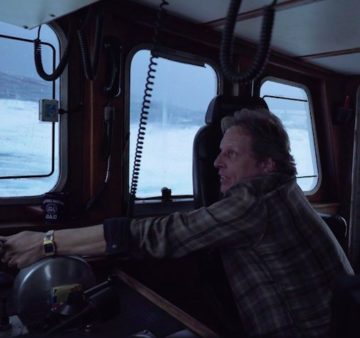 Opi season begins on tonight’s episode of Deadliest Catch which means Sig Hansen is back in the Northwestern’s wheelhouse. While he avoided the last storm, when brother Edgar was at the helm for Bairdi, the weather doesn’t let up. When a captain as seasoned as Sig says, “Whoa…” at the sight of a wave, you know it’s a big one. Our exclusive sneak peek shows a 35-foot rogue wave slamming into the boat, causing Sig to duck in the wheelhouse and, as Edgar later notices, buckling the steel of the bow like a tin can. “Gotta pay attention,” Sig says. “Gotta pay attention,” Watch the trailer, read the rest here 15:00
Opi season begins on tonight’s episode of Deadliest Catch which means Sig Hansen is back in the Northwestern’s wheelhouse. While he avoided the last storm, when brother Edgar was at the helm for Bairdi, the weather doesn’t let up. When a captain as seasoned as Sig says, “Whoa…” at the sight of a wave, you know it’s a big one. Our exclusive sneak peek shows a 35-foot rogue wave slamming into the boat, causing Sig to duck in the wheelhouse and, as Edgar later notices, buckling the steel of the bow like a tin can. “Gotta pay attention,” Sig says. “Gotta pay attention,” Watch the trailer, read the rest here 15:00
The Fishermen’s Mission and its 130-year lifeline to Scotland’s coastal communities
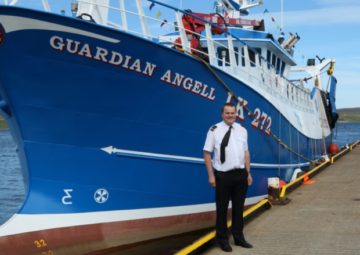 FOR the communities which draw their livelihood from Scotland’s forbidding seas, the Fishermen’s Mission has been a steadying anchor for more than 130 years. And with tragedy and danger continuing to blight the fishing industry, the Fishermen’s Mission believes its work is as relevant now as it was in the late 1800s when the first staff set sail to deliver food, compassion and the gospel to Scotland’s fishing crews. The reach of its work is today as broad as it is deep, with the charity helping not only the men at sea but the families of those employed in what the mission describes as the ‘most dangerous peacetime occupation’. Read the story here 13:32
FOR the communities which draw their livelihood from Scotland’s forbidding seas, the Fishermen’s Mission has been a steadying anchor for more than 130 years. And with tragedy and danger continuing to blight the fishing industry, the Fishermen’s Mission believes its work is as relevant now as it was in the late 1800s when the first staff set sail to deliver food, compassion and the gospel to Scotland’s fishing crews. The reach of its work is today as broad as it is deep, with the charity helping not only the men at sea but the families of those employed in what the mission describes as the ‘most dangerous peacetime occupation’. Read the story here 13:32
Regardless of legally caught sharks, California’s ban on possession and sale of shark fins stands
 California’s ban on the possession and sale of shark fins survived a legal challenge Monday when the U.S. Supreme Court rejected an appeal by Bay Area suppliers and sellers of shark fin soup, a traditional dish in the Chinese American community. “The purpose of the (California) shark fin law is to conserve state resources, prevent animal cruelty, and protect wildlife and public health,” the Ninth U.S. Circuit Court of Appeals in San Francisco said in a 2-1 ruling. The court said opponents of the state law had acknowledged that it still allows the use of about 95 percent of any legally caught shark for meat, skin and oils. The Obama administration at first supported opponents of the state law, filing arguments in 2013 that disputed California’s authority to restrict the sale of sharks that had been legally caught in federal waters. But it later changed its position after discussions with state fish and wildlife officials and said the two laws could be harmonized, with federal rules governing shark fishing while California regulated commerce within the state. Read the rest here 12:29
California’s ban on the possession and sale of shark fins survived a legal challenge Monday when the U.S. Supreme Court rejected an appeal by Bay Area suppliers and sellers of shark fin soup, a traditional dish in the Chinese American community. “The purpose of the (California) shark fin law is to conserve state resources, prevent animal cruelty, and protect wildlife and public health,” the Ninth U.S. Circuit Court of Appeals in San Francisco said in a 2-1 ruling. The court said opponents of the state law had acknowledged that it still allows the use of about 95 percent of any legally caught shark for meat, skin and oils. The Obama administration at first supported opponents of the state law, filing arguments in 2013 that disputed California’s authority to restrict the sale of sharks that had been legally caught in federal waters. But it later changed its position after discussions with state fish and wildlife officials and said the two laws could be harmonized, with federal rules governing shark fishing while California regulated commerce within the state. Read the rest here 12:29
Fishermen, Scientists Collaborate to Collect Climate Data
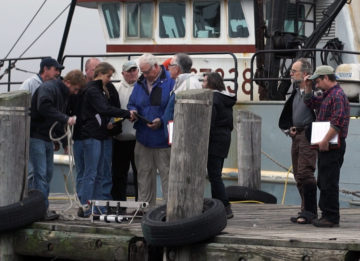 Fishermen plying the waters off the southern New England coast have noticed significant changes in recent years. Though generations of commercial fishermen have made their livings on these highly productive waters, now, they say, they are experiencing the impacts of climate change. “The water is warming up, and we see different species around than we used to,” says Kevin Jones, captain of the F/V Heather Lynn, which operates out of Point Judith, Rhode Island. To help understand the ongoing changes in their slice of the ocean, Jones and other fishermen in the region are now part of a fleet gathering much-needed climate data for scientists through a partnership with the Commercial Fisheries Research Foundation (CFRF) and Woods Hole Oceanographic Institution (WHOI). Video Read the rest here 10:02
Fishermen plying the waters off the southern New England coast have noticed significant changes in recent years. Though generations of commercial fishermen have made their livings on these highly productive waters, now, they say, they are experiencing the impacts of climate change. “The water is warming up, and we see different species around than we used to,” says Kevin Jones, captain of the F/V Heather Lynn, which operates out of Point Judith, Rhode Island. To help understand the ongoing changes in their slice of the ocean, Jones and other fishermen in the region are now part of a fleet gathering much-needed climate data for scientists through a partnership with the Commercial Fisheries Research Foundation (CFRF) and Woods Hole Oceanographic Institution (WHOI). Video Read the rest here 10:02
Pelagic red crabs return to Monterey, bad sign for fishermen
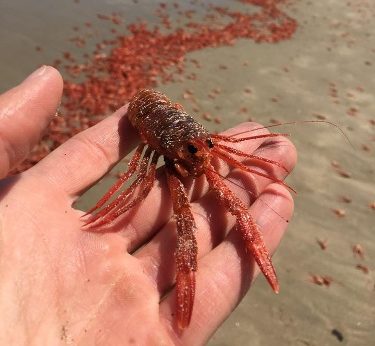 Monday, millions of pelagic red crabs washed ashore on Del Monte Beach in Monterey. A rare sight for beach goers but bad news for fisherman. “When I was a tuna fisherman we used to see them down south, and down south near the equator, down there that’s a good sign to catch tuna, but up here seeing them it’s not such a good sign,” said Gaspar Catanzaro with the Monterey Fish Company. These crabs like warm water and this past El Niño has kept the Monterey Bay warmer than usual. These conditions are preventing nutrient filled water to mix up to the surface And as a result the commercial squid season has been a bust since it opened in April. According to Catanzaro, his 6 boats have had a tough time catching any squid locally. Read the rest here 09:39
Monday, millions of pelagic red crabs washed ashore on Del Monte Beach in Monterey. A rare sight for beach goers but bad news for fisherman. “When I was a tuna fisherman we used to see them down south, and down south near the equator, down there that’s a good sign to catch tuna, but up here seeing them it’s not such a good sign,” said Gaspar Catanzaro with the Monterey Fish Company. These crabs like warm water and this past El Niño has kept the Monterey Bay warmer than usual. These conditions are preventing nutrient filled water to mix up to the surface And as a result the commercial squid season has been a bust since it opened in April. According to Catanzaro, his 6 boats have had a tough time catching any squid locally. Read the rest here 09:39
Oceana wants the feds to require 2,400 skimmer trawls to use TED’s, increase observer coverage
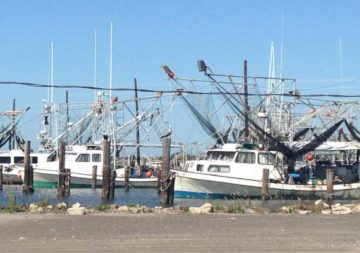 Skimmer trawls have been exempt from the requirement to use the devices while other nets on larger boats have been forced to comply since the 1980s, according to Tuesday’s Oceana report, “TEDs for All Trawls: A Net Positive for Fishermen and Sea Turtle.” The report calls on the federal government to require that all shrimp trawls use a smaller-spaced TED, require that trawls using the current TED to transition to a smaller spaced one, and to increase the number of federal observers for the shrimp industry. Currently, the TEDs have a 4-inch space between the bars, and Oceana would like to see shrimpers move to a 3-inch gap. Read the rest here 08:32
Skimmer trawls have been exempt from the requirement to use the devices while other nets on larger boats have been forced to comply since the 1980s, according to Tuesday’s Oceana report, “TEDs for All Trawls: A Net Positive for Fishermen and Sea Turtle.” The report calls on the federal government to require that all shrimp trawls use a smaller-spaced TED, require that trawls using the current TED to transition to a smaller spaced one, and to increase the number of federal observers for the shrimp industry. Currently, the TEDs have a 4-inch space between the bars, and Oceana would like to see shrimpers move to a 3-inch gap. Read the rest here 08:32
Getting CHOKED! Cod quota cuts, boats not fishing could interrupt New Bedford fish auction trading
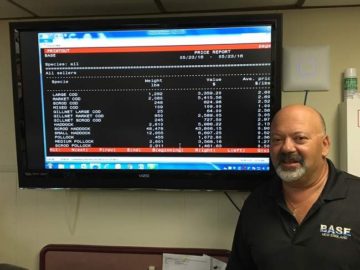 The fish auction that’s been a daily institution on the city’s waterfront for decades could see periodic closures over the next month or so, as a co-owner said Monday that this year’s significant cut to the cod quota is keeping many boats tied to the docks, rather than bringing in fish. Richard Canastra, co-owner of the Whaling City Seafood Display Auction since 1994, said Monday morning that in his view, “there won’t be” fish auctions on some days between now and July 4, when he expects commercial fishing activity to pick up again. “There’s not many fishermen fishing anymore,” Canastra said as he stood outside the auction building on Hassey Street. “A lot of the boats are just tied up — they’re not going to fish. Why would they fish if there’s only so much (allowable) cod?” Former New Bedford Mayor John Bullard, now regional administrator for NOAA fisheries, has said the new regulations create “about a 95 percent cut” since 2012 in catch limits for Georges Bank cod, a key species for New Bedford’s fishing industry. Read the rest here 06:43
The fish auction that’s been a daily institution on the city’s waterfront for decades could see periodic closures over the next month or so, as a co-owner said Monday that this year’s significant cut to the cod quota is keeping many boats tied to the docks, rather than bringing in fish. Richard Canastra, co-owner of the Whaling City Seafood Display Auction since 1994, said Monday morning that in his view, “there won’t be” fish auctions on some days between now and July 4, when he expects commercial fishing activity to pick up again. “There’s not many fishermen fishing anymore,” Canastra said as he stood outside the auction building on Hassey Street. “A lot of the boats are just tied up — they’re not going to fish. Why would they fish if there’s only so much (allowable) cod?” Former New Bedford Mayor John Bullard, now regional administrator for NOAA fisheries, has said the new regulations create “about a 95 percent cut” since 2012 in catch limits for Georges Bank cod, a key species for New Bedford’s fishing industry. Read the rest here 06:43

































